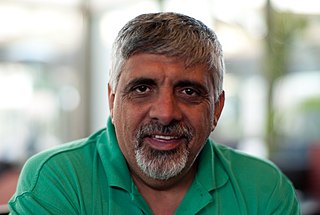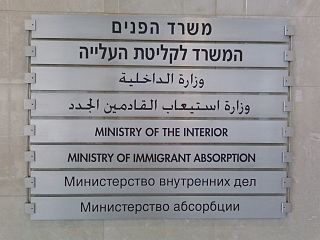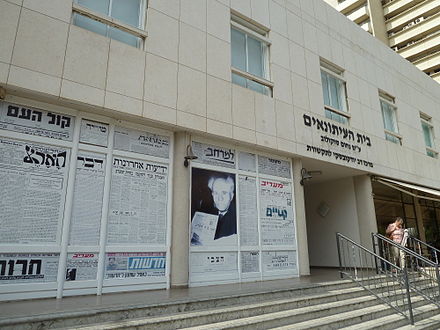
Haaretz is an Israeli newspaper. It was founded in 1918, making it the longest running newspaper currently in print in Israel, and is now published in both Hebrew and English in the Berliner format. The English edition is published and sold together with the International New York Times. Both Hebrew and English editions can be read on the Internet. In North America, it is published as a weekly newspaper, combining articles from the Friday edition with a roundup from the rest of the week.

Amira Hass is an Israeli journalist and author, mostly known for her columns in the daily newspaper Haaretz. She is particularly recognized for her reporting on Palestinian affairs in the West Bank and Gaza, where she has also lived for a number of years.

Media of Sri Lanka consist of several different types of communications media: television, radio, newspapers, magazines, and Web sites. State and private media operators provide services in the main languages Sinhala, Tamil and English. The government owns two major TV stations, radio networks operated by the Sri Lanka Broadcasting Corporation (SLBC), and newspaper titles in Sinhala, Tamil, and English.

The Israeli population is linguistically and culturally diverse. Hebrew is the country's official language, and almost the entire population speaks it either as native speakers or proficiently as a second language. Its standard form, known as Modern Hebrew, is the main medium of life in Israel. Arabic is used mainly by Israel's Arab minority which comprises about one-fifth of the population. Arabic has a special status under Israeli law.
Media of Morocco includes newspapers, radio, television, and the Internet.

Gideon Levy is an Israeli journalist and author. Levy writes opinion pieces and a weekly column for the newspaper Haaretz that often focus on the Israeli occupation of the Palestinian territories. Levy has won prizes for his articles on human rights in the Israeli-occupied territories. His critics characterize him as left-wing and accuse him of being a propagandist for Hamas.
Laws on censorship in Israel are based on British emergency regulations from 1945 that apply to domestic media, foreign newspapers and wire service transmissions from or through Israel.
The media in Iceland are well-developed for a country of its size. The Constitution of Iceland guarantees absolute freedom of speech. Therefore, Iceland’s media are among the freest in the world.
The media of Russia refers to mass media outlets based in the Russian Federation. The media of Russia is diverse, with a wide range of broadcast and print outlets available to the consumers. Television, magazines, and newspapers are all operated by both state-owned and for-profit corporations which depend on advertising, subscription, and other sales-related revenues. Even though the Constitution of Russia guarantees freedom of speech the country is plagued by both government and self-censorship. As a country in transition, Russia's media system is under transformation.
The print, broadcast and online media of Burma has undergone strict censorship and regulation since the 1962 Burmese coup d'état. The constitution provides for freedom of speech and the press; however, the government prohibits the exercise of these rights in practice. Reporters Without Borders ranked Burma 174th out of 178 in its 2010 Press Freedom Index, ahead of just Iran, Turkmenistan, North Korea, and Eritrea. In 2015, Burma moved up to 144th place, ahead of many of its ASEAN neighbours such as Singapore, as a result of political changes in the country.
The media of Syria consists primarily of television, radio, Internet, film and print. The national language of Syria is Arabic but some publications and broadcasts are also available in English and French. While television is the most popular medium in Syria, the Internet has become a widely utilized vehicle to disseminate content. Transcending all available media, the government seeks to control what Syrians see by restricting coverage from outside sources. Publications and broadcasts are monitored by members of the government. Syria is ranked as one of the most dangerous places in the world for journalists. There were 28 journalists killed in combat in 2012.

Daoud Kuttab, is a Palestinian journalist with American citizenship.

The Aftonbladet–Israel controversy refers to the controversy that followed the publication of a 17 August 2009 article in the Swedish tabloid Aftonbladet, one of the largest daily newspapers in the Nordic countries. The article alleged that Israeli troops harvested organs from Palestinians who had died in their custody. Sparking a fierce debate in Sweden and abroad, the article created a rift between the Swedish and the Israeli governments. Israeli officials denounced the report at the time and labelled it anti-Semitic. Written by Swedish freelance photojournalist Donald Boström, the article's title was Våra söner plundras på sina organ. It presented allegations that in the late 1980s and the early 1990s, many young men from the West Bank and Gaza Strip had been seized by Israeli forces and their bodies returned to their families with organs missing.
The Media of South Sudan is underdeveloped compared to many other countries, including fellow East African states like Kenya, Tanzania, and Uganda. Poor transportation infrastructure and entrenched poverty in the country inhibit both the circulation of newspapers, particularly in states located far from the capital of Juba, and the ability of media outlets to maintain regular coverage of the entire country.
All for Peace is a joint Israeli-Palestinian East Jerusalem based radio station that transmits from Ramallah in the Palestinian territories. It was founded in 2004 with the stated aim of having "a positive role in resolving the conflict" and describes itself as not-for-profit. A significant section of its independent revenue came from commercial advertising. It was the first radio station staffed by Israelis and Palestinians to broadcast in both Arabic and Hebrew. The Israeli and Palestinian co-directors of the station were joint winners of the International Council for Press and Broadcasting's "Outstanding Contribution to Peace" award in 2010, part of the International Media Awards. The station was shut down by the Israeli government in November 2011 for "broadcasting into Israel illegally".
Al Jazeera, owned by the government of Qatar, is currently one of the largest news organisations in the world, with 80 bureaus around the globe that produce extensive news coverage online and via TV channels in a number of languages, including Arabic and English. Al Jazeera also produces in-depth documentaries on current issues around the world. While Al Jazeera has a large audience, the organisation and the original Arabic channel in particular have sometimes been criticised and have been involved in several controversies.

The Arabic language in Israel is spoken natively by a large proportion of the population, reaching over 20 percent of the total population, mainly by the Arab citizens of Israel and among the Arabic-speaking Jews from the Arab world. Some refer to the modern Hebrew-influenced Levantine Arabic vernacular, spoken by many Israeli Arabs, as the Israeli Arabic dialect.
Al Jazeera is a Qatari state-funded broadcaster in Doha, Qatar, owned by the Al Jazeera Media Network. Initially launched as an Arabic news and current affairs satellite TV channel, Al Jazeera has since expanded into a network with several outlets, including the internet and specialty television channels in multiple languages.
TV, magazines, and newspapers are all operated by both state-owned and for-profit corporations which depend on advertising, subscription, and other sales-related revenues.
Media in Namibia includes radio, television, and online and print formats.















